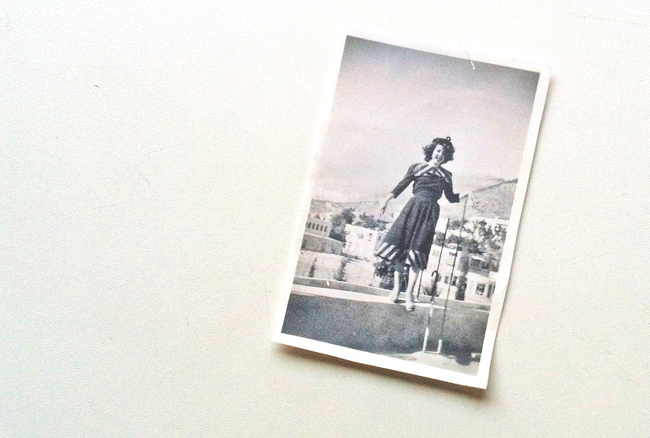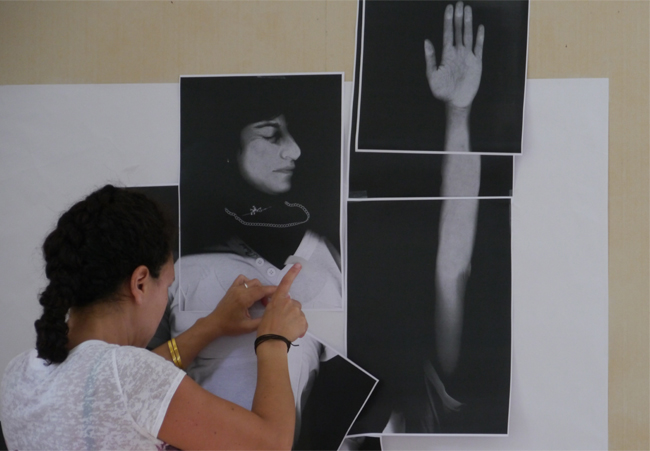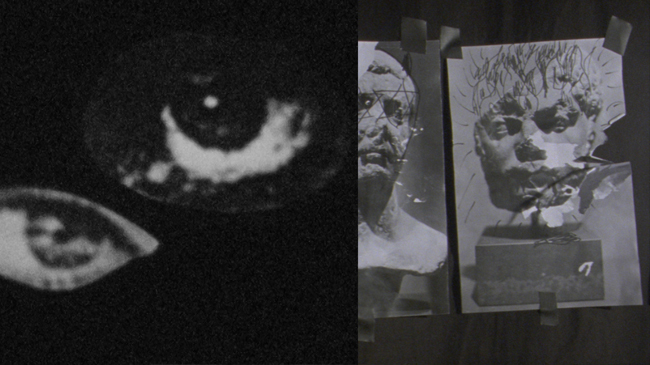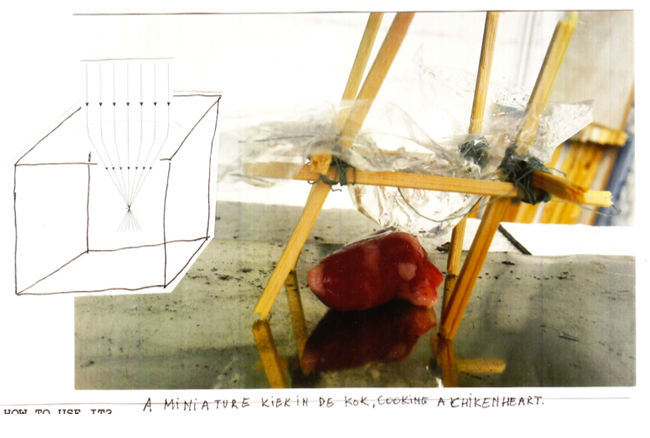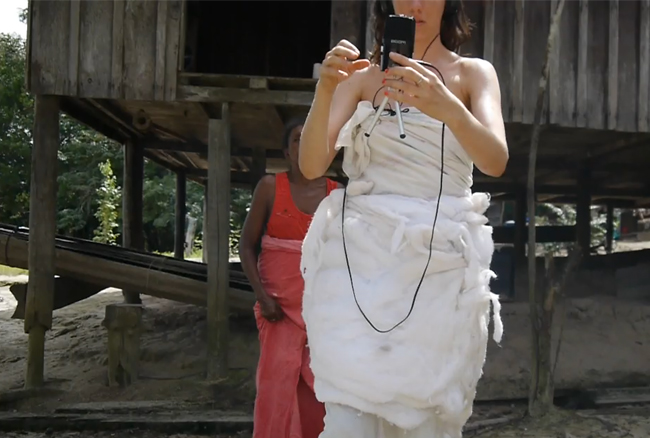| Having trouble seeing this email? Please see the online version here
| |
29/5 – 17.00 to 22.00h 30/5 – 12.30 to 22.00h For the full program click here Samah Hijawi, Philippine Hoegen,
laboratory of experiments in performance and politics, in residency at Acadeémie Royale des Beaux Arts Bruxelles (ARBA-ESA) Dexia Art Centre -Schildknaapstraat/Rue de l’Ecuyer 50, 1000 Brussel
>>><<<< In the frame of Aleppo‘s research project ‘Back to the Order’, six artistic researchers of a.pass will discuss, perform, exhibit and share their different takes on notions of ‘order’ and its simultaneous resonances of ease and discomfort, of political rigidity and potential, of aesthetic boredom and political reconsideration. Exploring the shifting territories of an order to be reconstructed, a.pass proposes ‘volver’ as an incentive to become involved, to revolve around recurring and shared interests, to recompose history in the aftermaths of an imploded revolution. Departing from the individual projects, concepts such as the domestic, evolving identities, (the act of) display(ing) and artistic production will be approached as the shifting ground on which the idea of order and its consequences can be explored and activated. On Friday the 29th and Saturday the 30th of May, we invite you for performances, film screenings and installations, to share in the artistic research processes, participate in workshops and attend lectures and presentations by the guests of the researchers: Patricia Reed, Gonçalo Pena and Petra van Brabant.
program:
Samah Hijawi lecture performance This work is an exploration of the aesthetics of loss, and the images recreated – by the looser – of a place and a time that perpetuates through fragile narratives, utopic images, and nostalgic songs – tokens and emblems for preserving memory. Located in political and artistic histories around Palestine, ‘The Wandering Singer of Tales’ questions the temporality of images reproduced of lost places, and how these function in the present following a ruptured historical trajectory of dislocation, trauma and exile in the last century.
Cecilia Molano one-to-one performative installation Writing becomes trace. An unthinkable process of alchemy. Each word is, again, what it was before becoming a word: an image, a hesitation, a movement. Narrative melts into drawings. Life remains there, in the paper, as a footprint. The diary is an invented document: the fiction of oneself. In this work we turn back to the place of words before being articulated. This installation is an experiment in co-writing, reading and (re)creating.
Philippine Hoegen video installation, performative interventions Versioning – as in: regarding objects in the way they appear to us as versions of themselves – means that other versions are possible, probable. Different versions are present simultaneously and may become perceptible through a slight shift of perspective or a change in the gaze. The point of this exercise is a rearrangement of relations between things. Traits, qualities and characteristics that were assumed to be constitutive for ‘our’ of ‘their’ selves, are questioned and relativized; they may in fact simply be a consequence, an outcome, of the angle at which you are looking. This implies fluidity in the nature of relations, it destabilises presumptions and assumptions. It is a way to understand the constant flux in the order of relations between things. Undergoing (Another Version, 2015), or trying to embody (Regarding David and Dividing David, 2 performances, 2015) are ways in which I attempt to see or experience things –objects, situations, myself- from more or other sides than the given frame allows. Unraveling through history different narratives about an object constructed and deconstructed through display (The Borneo Trophy, performance, 2015) or re-ordering the display (Arena, video installation, 2015) are strategies to shift or look beyond the frame, producing different objects, or more precisely different versions: the object as a different version of itself.
Sara Santos films deuses vadios (stray gods) Excavate (‘ekska, veit) vb excavates, excavating, excavated. 1 to remove (soil, earth etc.) by digging; dig out. 2 to make (hole or tunnel) in (solid matter) by hollowing. 3 to unearth (buried objects) methodically to discover information about the past. (C16: from L. cavãre to make hollow, from cavus hollow). The dead heroes are closer to a ruin-state than to glorious, tragic death. Putting aside the epic patina, ruin is a romantic process of decay. The hero itself is the embodiment of a zombie ideology, a living-dead, a transition. By ideology, I mean immaterial constructions (symbolic ‘texts’) that impact and condition our experience of the world, and ultimately become materialized in it. Coming back to ‘an order’ unfolds a discussion about how the common experience of a crisis (war, uprising, revolution, disaster..) becomes inscribed, or eventually, cultural. My research focusses on the left-over materials of a given crisis, on the symbolic objects of those experiences, and their trajectory towards an eventual stabilization into oblivion. How do they change into something else, or stay resilient? Resonating for decades, they appear as distortions of contexts long gone.
Gosie Vervloesem performance workshop The answer on how to cope with the chaos in our daily lives lies at the bottom of a Tupperware box. ‘Recipes for Disaster / The Magazine/Tupperware Party’ cooks up crucial questions: how to argue for messy and less sterile life in times of Ebola? And, how to free ourselves from the quarantine of our own bathroom? Everybody knows Tupperware, the handy plastic boxes to store and conserve food, for eternity. ‘Recipes for Disaster” uses the format of the Tupperware Party (women getting together around the kitchen table to attend demonstrations of shiny plastic boxes.) And at the same time disrupts the idea that everything can be nicely stored away.
Veridiana Zurita talk For 3 months I have been working together with a riverside community in the Amazon on re-enactments of Brazilian soap operas. I spent 3 days with each family and used their house as the studio for filming. Eating what they eat, sleeping as they do, watching what we watch: soaps. Every night we looked at the soap and picked a scene to re-enact the next day. While re-enacting different logics of appropriation were inaugurated. The way soaps seem to order language and physicality were disturbed by those re-enacting it. During a talk I will share some of the footage, the working methodologies, the context and ideas around the first edition of this ongoing project.
workshops & lectures >>><<<< Petra Van Brabandt table talk – Fri 7pm The disruptive movements of the last years were hardly a threat to the state of order. They might be the first signals of a disruption to come; therefore to entertain the idea of ‘back to an order’ is far too precocious, even pernicious to the imaginative process of unworking the order. I want to focus in this table-conversation on the order of Fort Europe, which hasn’t been radically contested. Our obsessions with order and stability seem to warrant the mass grave outside our safety gates. This is the horror of order showing its face, again. Inspired by the work of Gosie Vervloessem, I want to compare Fort Europa to the dynamics of fear of the kitchen, and question its order, hygiene, productivity and purpose. >>><<<< Patricia Reed Mobile Orders lecture – Sat 4.45pm ‘Order’ in and of itself, is a structural proposition in which sets of functions, behaviours, relations and norms can play out (while making other operations impossible or extremely difficult to carry out). Within the ‘social’, order is largely cultural, meaning productively artificial, subject to infinite mutability. So to demand ‘order’ is not (necessarily) to seek to submit oneself to relations of authoritarian dominance, but to seize upon structural possibilities as a project for construction. ‘Order’, in this way, is mobilised as an affirmative project – a freedom to construct new systems of cohabitation (rather than simply a freedom from something). read more >>><<<< Gonçalo Pena Master Class – Sat 12.30 to 3.30pm Within a conscious danger of falling back into romanticist politics and trying to avoid this trap, I would take this idea of an ethical or even several ethical lines to think drawing as one of the tools we have to challenge politics of smoothing and soothing the collective body onto mindless consumerism. It is important to state that this collective body has still a human multitudinous and restless soul, from which the annoying and frequent twitches call for permanent police vigilance. Moreover this body comes from the box including with it technology and complete ecosystems. So it comes the time where this soul struggles and seem itself forced to draw her painful lines of choice, discovery, recovery of concepts and criticism. read more | |
tel: +32 (0)2 411.49.16 | |

